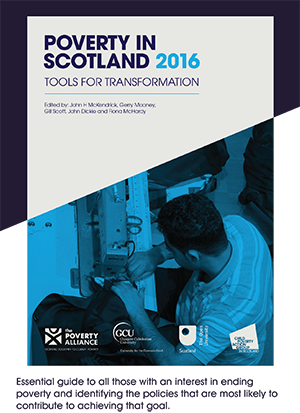 Poverty in Scotland 2016 explores different aspects of poverty and disadvantage in Scotland in the context of the rapidly changing political context in Scotland – as well as in the UK. Published in advance of the May 2016 Scottish Parliament elections, it is concerned to highlight the continuing scourge of poverty in all its forms across contemporary Scotland. The book also examines different dimensions of poverty and considers the key tools that may be used in addressing poverty.
Poverty in Scotland 2016 explores different aspects of poverty and disadvantage in Scotland in the context of the rapidly changing political context in Scotland – as well as in the UK. Published in advance of the May 2016 Scottish Parliament elections, it is concerned to highlight the continuing scourge of poverty in all its forms across contemporary Scotland. The book also examines different dimensions of poverty and considers the key tools that may be used in addressing poverty.
Poverty in Scotland 2016 was launched in March 2016 at The Open University in Scotland’s national office in Edinburgh. Each of the main Scottish political parties had representatives attending and speaking to the question of poverty and how to tackle it. The audience included politicians, academics, researchers, trade unions, campaigners, third sector organisations and students. The Scottish media were also in attendance.
The 2016 edition in the Poverty in Scotland series contains up to date data and information about many of the different dimensions of poverty and their impact in Scotland. Contributors focus on specific areas of poverty and consider some of the ways in which these can be addressed by policy. Here the emphasis on ‘the tools’ to combat poverty and disadvantage is a central theme running through the collection.
The discussion of poverty, deprivation and inequalities more generally, have increasingly been entangled with issues of Scotland’s constitutional position and future. The period since the 2014 Scottish Independence Referendum has been politically volatile and the pace of change much greater than in a considerable time. While the issue of poverty is rightly understood to be linked to wider changes in Scotland and the UK, at the same time it can become marginalised with the limelight and focus on constitutional matters alone. In Poverty in Scotland 2016, the editors and authors have been concerned to lay out the ways in which key tools, including social security, fair work, education and local government, can be used over the next Scottish Parliament to transform Scotland toward a poverty free, much fairer and socially just society.
Poverty in Scotland 2016 is published by the Child Poverty Action Group (CPAG) in Scotland; The Open University in Scotland, Glasgow Caledonian University and the Poverty Alliance, and draws together the expertise of academics, anti-poverty campaigners and other experts from across health, education, housing and local government and other areas of social policy.
In launching this edition of the book, John Dickie, Director of the Child Poverty Action Group (CPAG) in Scotland said:
Despite the challenging circumstances the authors of Poverty in Scotland 2016 are all absolutely clear that here in Scotland, government, employers and civil society have significant levers that can be used to transform Scotland toward a poverty free country. Powers to create more progressive taxes, to enhance social security, to pay a living wage and provide decent jobs, to focus our health service on tackling inequalities and to ensure housing is affordable must all be used in the next five years with a drive and ambition the likes of which we have never seen before.
Gerry Mooney, Senior Lecturer at The Open University in Scotland, commented:
The Chancellor's promise of more austerity and a further shifting of risk onto the already disadvantaged at the same time as the well-off increase their wealth is a vital reminder that poverty is the product of social, economic and political decisions. But despite the challenges at UK level it is clear that policies in Scotland do matter. The independence referendum and proposed devolution of new powers to the Scottish Parliament have opened up space for new ways of thinking about poverty and about the role of the welfare state in general. Poverty, and the social harm it causes can, and must, be prevented by action at every level. The challenge now is to shift the spotlight onto those processes that work to generate such widespread poverty at the same time as they enable others to accumulate such extreme wealth.
Since the publication of the book, new powers have been devolved to the Scottish Parliament taking devolution in directions well beyond the visions that surrounded its introduction in 1998-1999. Importantly these include additional welfare and tax related provisions. These are of course controversial areas, as is the wider discussion of poverty and inequality. We are reminded by this that devolution is a process and that there are tools available to Scotland now that can be utilised in the fight against poverty. It remains to be seen if these powers are sufficient or if further devolution is required, or if there is the political will and commitment to tackling the underlying causes of poverty.
The Open University is grateful to the Child Poverty Action Group for permission to provide access to on OpenLearn. You can find further information about CPAG Scotland and its policies and publications on the CPAG website.
Poverty in Scotland 2016: Tools for Transformation
- Publication date: 2016 Format: Paperback, 314 pages
- Published by: Child Poverty Action Group
- ISBN: 978-1-910715-18-5
The book costs £15 and you can order a hard copy on the CPAG website. Alternatively, you can .
Rate and Review
Rate this article
Review this article
Log into OpenLearn to leave reviews and join in the conversation.
Article reviews